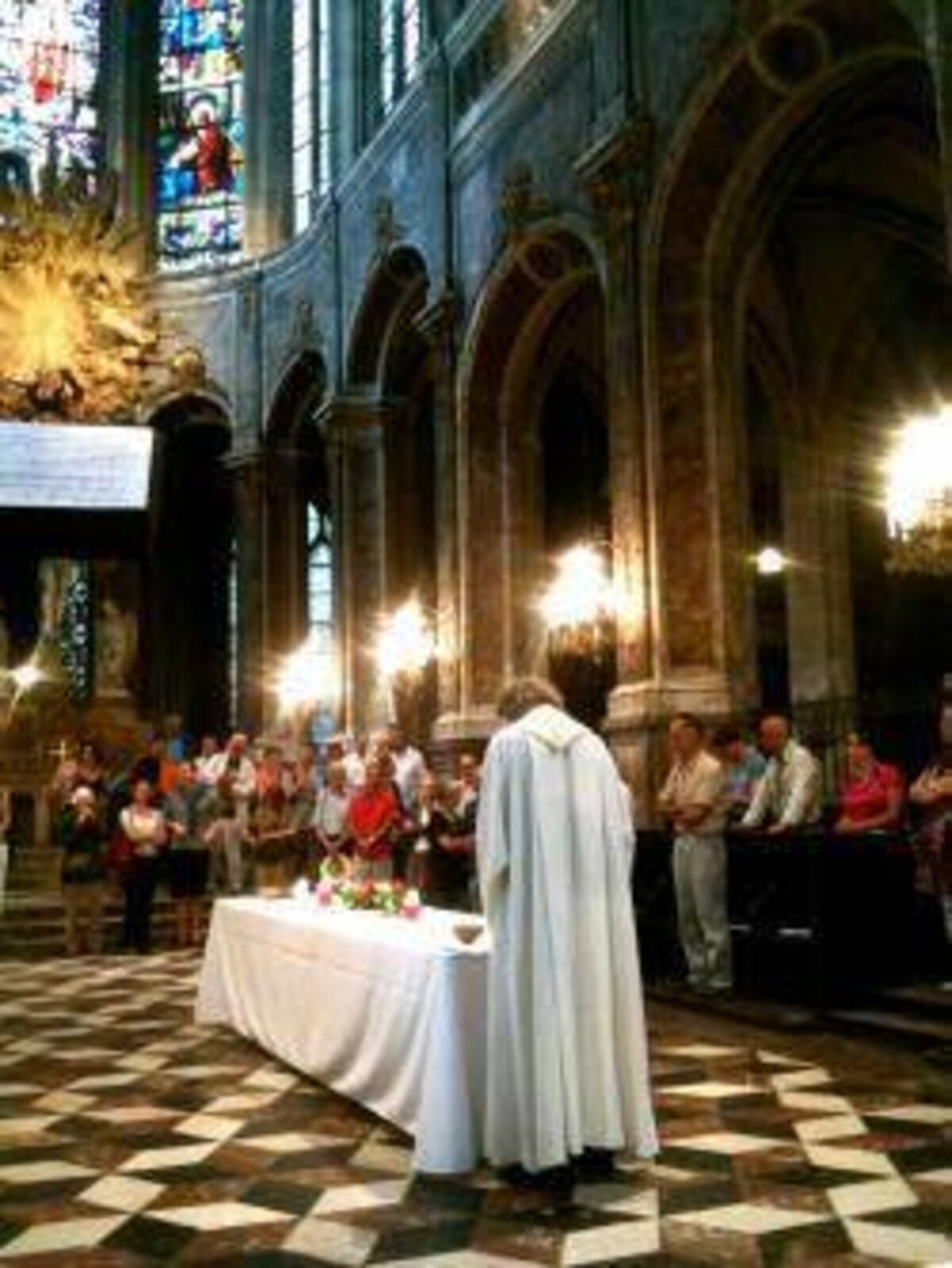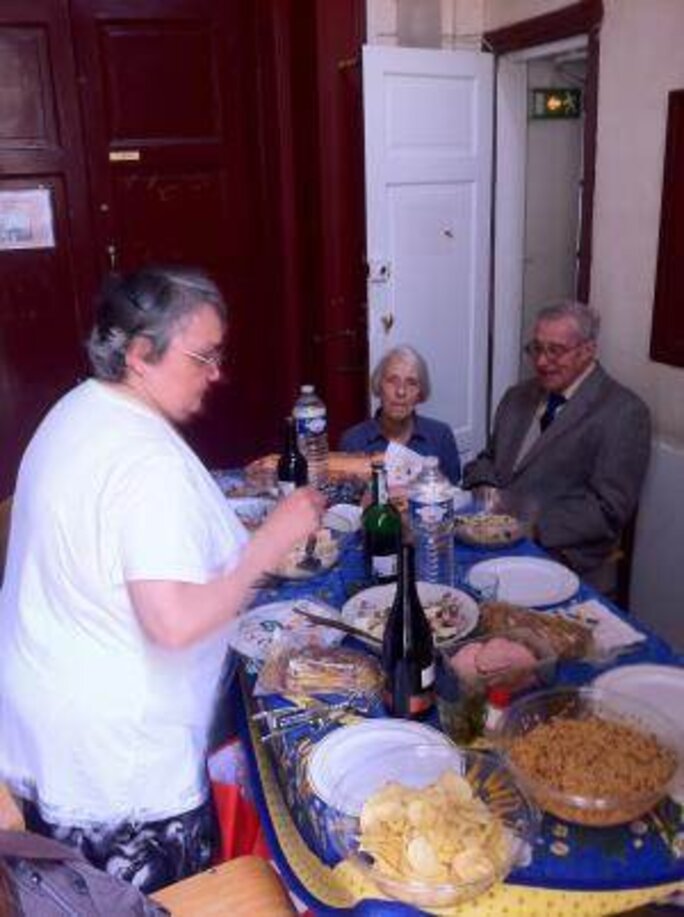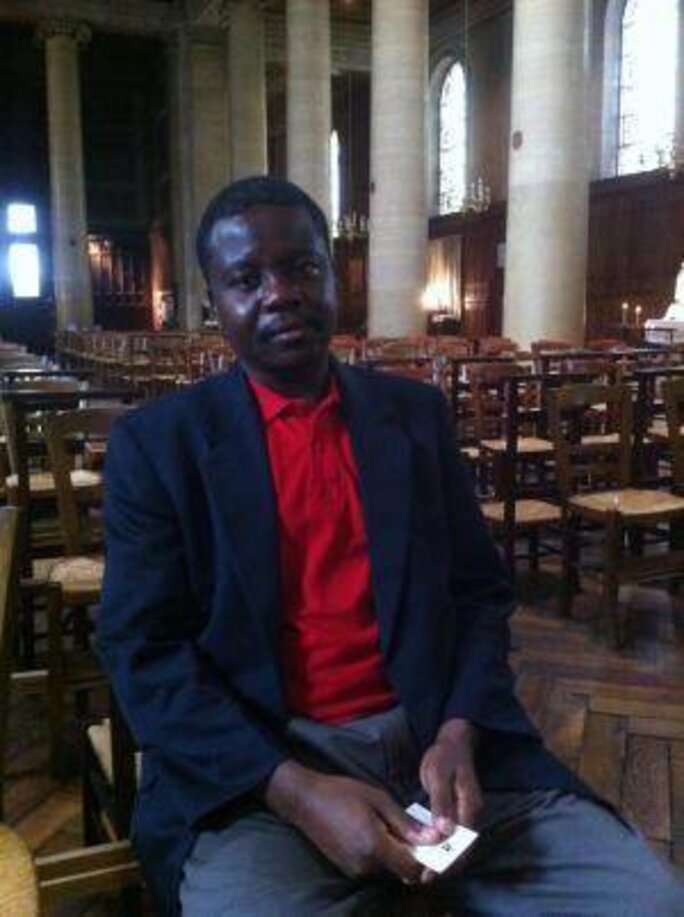The French Catholic Church this week took the unusual step of challenging government policy-making by organizing the reading of a prayer in churches across the country against President François Hollande’s plans to legalize same-sex marriages and to grant child adoption rights to gay couples.
The prayer, initiated by Cardinal André Vingt-Trois, Archbishop of Paris and President of the Conference of Bishops of France, was read by priests and parishioners during the traditional yearly celebrations on August 15th for the feast of the Assumption.
Congregations prayed for elected officials to end their support of Hollande’s intended reforms "so that their sense of the common good will overcome special demands", while also opposing adoption rights for gay couples with a call that children "cease to be objects of the desires and conflicts of adults and fully benefit from the love of a father and a mother." (Click on prolonger' tab, top of page, for the full text in French).
Church spokesman Monsignor Bernard Podvin said the prayer was decided in order to "raise the consciousness of public opinion about grave social choices."
The highly controversial move, which caused outrage among gay rights groups, was planned after Hollande’s election in May. During his campaign, Hollande promised legislation to legalize gay marriage and adoption rights, and the proposed reform is now due to be put before the socialist-dominated National Assembly, the lower house of parliament, in a bill early next year.
In January, Pope Benedict declared that same-sex marriage threatened "the future of humanity itself" and the Catholic Church is now in open conflict with the plans of several other governments, including those in the US and Britain, to legalize gay marriage.
Hollande has also upset the Church with his openness to easing the law on euthanasia, and since taking office he has set up a commission to review the issue.
Cardinal André Vingt-Trois called the text read out during the Mass in churches this week a “Prayer for France”, borrowing the name from King Louis XIII who, in 1638, issued a decree that all churches would observe a prayer for the well-being of the nation on August 15th, the day Catholics believe the Virgin Mary was assumed bodily into Heaven. The practice was largely abandoned from the end of World War II.
The ‘Prayer for France’ has brought the French Catholic Church, which traditionally avoids political battles, into an open and potentially divisive campaign against President Hollande, whose position on gay marriage is credited by opinion polls as having the support of a clear majority of the public.
The Cardinal of Lyon, Philippe Barbarin, defended the Church’s position by referring to the Bible’s definition of marriage as an act created by God to join man and woman. "Nobody should be surprised that we Catholics think the first page of the Bible is right, even more so than a parliament," he told French radio station Europe 1 earlier this month.
“François Hollande is committed to these reforms and they have been reaffirmed by his government,” said Nicolas Gougain, a spokesman for the Inter LGBT gay rights group, interviewed by TV channel France 24. “We can count on getting a majority in parliament and no prayer will be able to block this necessary legislation. Religion has no place in politics.”
"The text of the prayer is homophobic,” he added. “The church’s definition of family is far from the reality of the diverse families we see today, same sex, mixed or single parents."
'Centuries ago, we couldn't baptise black people'
Among the very few priests who have publicly refused to follow Cardinal André Vingt-Trois’ initiative is Father Jacques Mérienne, whose Saint-Merri church lies in the Marais district of Paris, a high-profile ‘gay quarter’ and centre of gay rights militancy, and where Mediapart joined the congregations of Saint-Merri and neighbouring churches for the Assumption Day celebrations.
“We must be receptive to all men and women who welcome children,” Mérienne told the congregation. “We will accompany them, I hope, with the heart of Mary.” The church was packed, thanks in part to a crowd of journalists, who he jokingly invited to share in the communion “if they so wish”.

Mérienne said he had received no order to read the prayer. “You cannot imagine the freedom we have in the church,” he told Mediapart. “If the Pope wanted to celebrate mass here, he would need to ask my permission.”
Two years ago, Mérienne’s church was the target of an attack by members of a hardline Catholic group called Civitas, who threw eggs at the nave in protest at a prayer service he had organized for Aids victims.
“There exist very homophobic currents within the [Catholic] Church,” he commented. “These are above all a reflection of latent homophobia in society, that which prohibits gays from giving to blood banks.”
Among the congregation present on Wednesday was Patrick Sanguinetti, head of a Christian gay support group called David & Jonathan, and whose members include other parishioners of Saint-Merri. “The Church is today trying to regain lost ground,” he commented. “This [Prayer for France] operation reveals the Church’s fear. Why do our religious leaders feel afraid that two men can make their love official in a civil sense?”
Gay activists are a minority among the congregation at Saint-Merri church, and while Mérienne publicly pronounces himself in favour of same-sex marriages sealed by civil ceremony, he doesn’t think the time has yet come for their celebration in church. “Because it requires a sacrament, there as to be a consensus within the Church” he explains. “I can’t take a personal position. It needs to be done step by step. Four centuries ago, we didn’t have the right to baptise black people. It was Jean-Paul II who repented over this.”
During the Assumption Day Mass, one of his parishioners, Colette (last name withheld), 83, read a prayer she wrote opposing the message of Cardinal André Vingt-Trois. “Make us able, God, to feel the essential things of love within couples, as diverse as they may be.” After the service, she explained why she supported legalization of same-sex marriages and the right of gay couples to adopt children. “I speak with my own experience as an unloved child,” she said. “I know that a child must simply be the product of love, even [if that be] homosexual.”
She also supported the right of lesbian couples to receive artificial insemination. “Why not?” she asked. “When the desire for a child is there, and it can make people happy.”
'My faith, not the Church, will dictate my choice'
In the nearby church of Notre-Dame des Blancs Manteaux, situated on the rue des Blancs Manteaux, Father Jau, 86, led the Assomption Day service in front of a congregation of some 80 people. Retired, he had been called up to replace the church’s official priest who was on holiday. “My head and legs are all present, so I’m here to help out,” he explained.
Father Jau happily organized the reading of the Cardinal’s ‘Prayer for France’ on Wednesday. “The Church must not place itself outside of society,” he said. “It brings its own contribution. There are real problems, they must not be ignored, but the laws of nature must be respected.”
“Marriage is an institution made to preserve the life of a child,” he continued. “It mustn’t be allowed to become any old thing.” Regarding adoption rights for gay couples, he commented: “That is the first deviation. It’s not catastrophic, homosexual couples are capable of better raising their children than others. But if we begin to accept anything and everything, it will never stop.”
The ‘Prayer for France’ was read to the congregation of Notre-Dame des Blancs Manteaux by Monique (last name withheld), a jovial and polite 78 year-old. “Homosexuality is an illness,” she said, speaking after the mass, “something abnormal, unnatural.”

However, she said she had nothing against gay marriage in itself, and that she would have refused to read a text that openly attacked the idea. What she objected to, she explained, was child adoption rights for gay couples. “I have been a widow for 40 years,” she said. “I raised my children alone. I refused to take the role of father. A father and a mother is complementary. A woman cannot take on the role of father.”
“Hollande is ready to say yes to all that. Sarko [former president Nicolas Sarkozy] wasn’t perfect, but on this topic he was clear as crystal.”
The church of Saint-Denys du Saint-Sacrement lies just a few minutes’ walking distance away, on the rue de Turenne. The priest officiating on Wednesday was Father Aduel Joachin

, 42. His regular parish is in the Haitian capital Port-au-Prince. Currently on a visit to Paris, where he previously spent five years studying at the Institut catholique, Church officials asked him to replace Saint-Denys du Saint-Sacrement’s priest, who was absent on holiday.
He read the ‘Prayer for France’, explaining: “I am passing through, I couldn’t do anything other.” He said he understood the position adopted by the Church. “The Church is assuming its responsibilities, it has always had this position, tied to the Evangels. Some issues are immutable for the Church.”
But he admitted that he himself was uncertain about the question. “Will homosexual marriage provide a balance or an unbalance for society? For the moment, I don’t have an answer,” he said. “The current question will force us to review our sets of values. Before, the norm was one woman, one man. Today, we need to rethink all that.”
On the issue of child adoption rights for gay couples, he commented: “The problem is that of the education of the adopted child. Will parents have the correctness to raise them with the freedom of being what they want to be?”
He said he regretted that the debate is absent in Haiti. “The subject is taboo. A person who is homosexual cannot admit it. He runs the risk of being outcast.” He described the discussion in France as a sign that society was “alive, moving”, but cautioned: “But what is fundamental is the conclusion.”
In reaching his own, he said: “The reflections of the French Church can help me, but my judgment will not be reliant upon their opinions. It is my faith that will lead me to one side or the other.”
Asked if he would have read the Prayer for France if he was the Saint-Denys du Saint-Sacrement church’s regular priest, he answered: “I would have organized discussion days with philosophers and theologists.”
A few streets away from Saint-Denys du Saint-Sacrement, on the rue Saint Antoine, is the church of Saint-Paul Saint-Louis. It was King Louis XIII, he who initiated the first ‘Prayer for France’, who ordered its construction in 1627. Last Wednesday, the curate had asked 81 year-old Marie-Claude (last name withheld), one of his congregation, to read the prayer. “We were asked to say it, it was an instruction,” she said.
Marie-Claude describes herself as devout. When Mediapart interviewed her after the Mass, she said she had not understood that the text underlined the importance that a couple was formed by opposing sexes. “It was the sexton who gave me the text,” she said, expressing surprise, “but I’m not against homosexuals marrying, nor against adoption. It’s better that two women stay together than [heterosexual] couples who separate.”
“The Church has every right to say what it thinks, but it shouldn’t influence political debate,” she added. “The Church is against divorces, and that never stopped them from happening.”
-------------------------
English version: Graham Tearse


